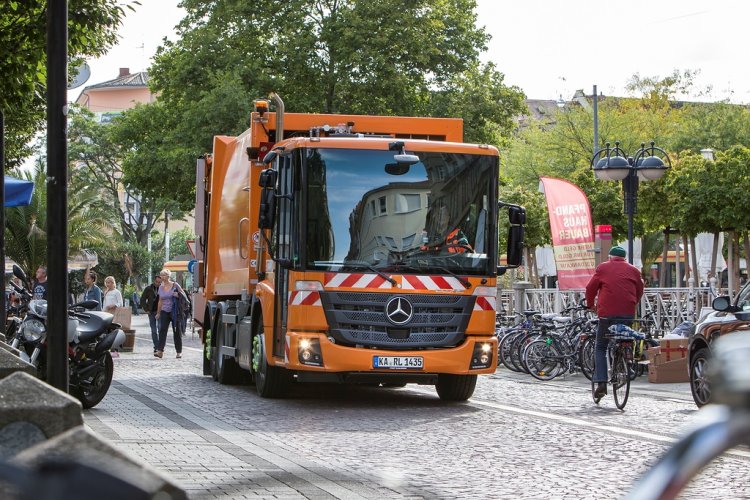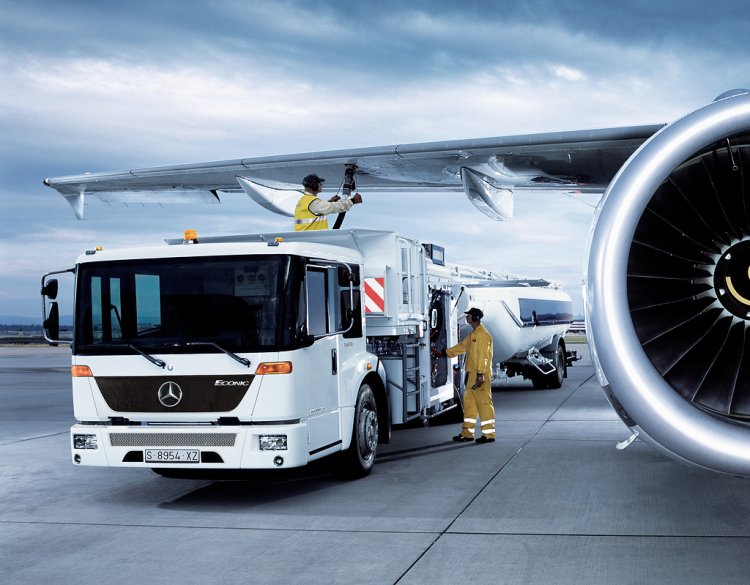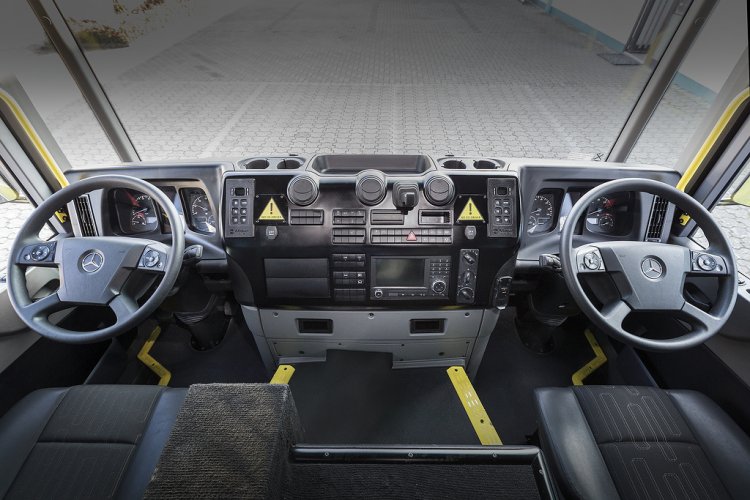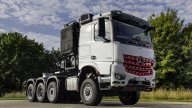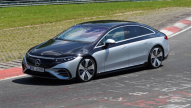Mercedes-Benz Econic: 25 Years of Innovation History With a Future
Mercedes-Benz Special Trucks has been constantly opening new chapters in the success story of the Mercedes-Benz Econic for 25 years: Since production was launched in 1998, it has been meeting the municipal, collection and distribution haulage sectors’ high requirements for ergonomics, safety, economy and ecology. Ever since, the Econic has been continuously expanding its urban operations in Europe and overseas: Its range of applications extends from municipal use as a waste collection and disposal vehicle to city delivery operations and as an emergency vehicle for fire departments and road construction projects. In the meantime, the fully electric eEconic has replaced the natural gas engine and is rolling off the production line alongside the conventional Econic in Wörth.
Milestones in the Econic success story
The Econic was presented for the first time in 1998 at the Entsorga trade fair as an innovative low-floor special vehicle, and has been built at NAW (Nutzfahrzeuggesellschaft Arbon & Wetzikon) in Arbon on Lake Constance, Switzerland, ever since. In 2001, the Econic family was expanded to include a 6×4 variant, to which the Econic 8×4/4 with four-wheel steer and four-wheel drive was added in 2004. The Econic with a natural gas engine was introduced in 2002. The following year, production was relocated to the current Econic site in Wörth. The 5000th Econic rolled off the production line there in 2005.
In 2009, more than 1500 Econic vehicles were delivered for the first time within one year, and two years later a total of 10,000 Econic vehicles was exceeded. This was followed in 2013 by the world premiere and the start of series production of the new Econic generation, whose basic components are still in use today. A further milestone was reached in 2022 for sustainability goals: The all-electric eEconic has been added to the conventional Econic in the product range.
Around 28,000 Econic trucks have been built and delivered to date. Of these, around 85 percent are used for waste disposal and around five percent are used by fire brigade, for example as turntable ladder vehicles. A further 10 percent are used for other operations, as dump trucks or cement mixers, for example, for road construction or as refueling or catering vehicles at airports.
The latest generation of the Econic with Euro VI diesel technology
Today’s Econic is available as a two-, three- or four-axle vehicle with a permissible gross mass of 18, 26 and – in the four-axle variant – 32 tons. It is available with a low or high cab, wheelbases from 3,450 to 5,700 millimeters and engine outputs from 200 kW (272 hp) to 260 kW (354 hp). In addition to the tried-and-tested Allison torque-converter automatic transmission with six gears, the Econic can, as an option, also be equipped with the fuel-efficient Mercedes-Benz PowerShift 3 automatic transmission with 12 forward and four reverse gears, which has specially adapted drive programs for urban traffic.
If individual solutions with complex conversions for specific operations are required, they can be implemented by Mercedes-Benz Custom Tailored Trucks (CTT) on request. If necessary, the wheelbase can be shortened even further or the vehicle width can be reduced, for example.
From Wörth to the wide world: international examples of use for the Econic with diesel drive technology
Over the past 25 years, the Mercedes-Benz Econic has proven itself to be a versatile municipal professional – both in Germany and across large parts of Europe and beyond.
In the Vatican, the Econic has already been in use as a fire engine since 2005, while the Hanover Fire Department uses 16 fire engines. In the Scandinavian markets, more than 150 Econic trucks are performing their tasks, and in Singapore, the Econic three-axle vehicles with steerable rear axle and a rear loader body deployed there demonstrate how waste can be recycled efficiently in cities with millions of inhabitants.
A key market for the Econic is Great Britain. In 2019, one of the biggest waste disposal and recycling companies in the UK market also used several Econic vehicles as set-down skip loaders and roll-off dump trucks for the first time. The Econic for construction-site haulage was awarded the London Cycling Award for its exemplary safety systems.
In Australia and New Zealand, the Econic Dual Control meets the requirements of local municipal waste disposal companies with two fixed steering columns and two steering wheels. Therefore the driver can always sit on the right side in order to keep an eye on the work of the side loader waste collection system.
In the USA, the Econic known as Freightliner Econic SD (“Severe Duty”) is used as a front-loader disposal vehicle. The final assembly of the bodyshell supplied by the Wörth site is carried out at Freightliner Custom Chassis Corporation in Gaffney/South Carolina. It is completed and adapted to the North American market there and a 350 hp six-cylinder from the Medium Duty Engine Platform of Daimler Trucks is added.
Environmentally friendly on the road for two decades thanks with a natural gas engine
Although the Econic has been available with a natural gas engine since 2002, the Econic NGT (Natural Gas Technology) could increase its environmental compatibility from March 2015 on. The CO2 emissions of the drive system with compressed natural gas (CNG) are up to 20 percent lower than those of its diesel counterpart. Using renewable biogas has further improved the CO2 footprint of the Econic NGT. The performance of the six-cylinder in-line natural gas engine M 936 G with 222 kW (302 hp) from a displacement of 7.7 liters achieved the values of a comparable diesel engine.
Around ten percent of the Econic vehicles sold feature the environmentally friendly NGT drive. In 2022, the Econic NGT stepped aside to allow production of the battery-electric eEconic.
Municipal fleets appreciate the advantages of the Econic NGT
Back in 2009, 108 Econic NGT trucks were delivered to Athens for municipal waste disposal. A Swedish waste disposal company uses 50 Econic NGT trucks in Stockholm. At Vienna Airport, the Econic NGT is used as a catering vehicle with its low cab because the small vehicle height allows it to drive under the wings.
The biggest Econic NGT vehicle fleet is in Berlin: Berliner Stadtreinigung (BSR) has been relying on the Econic with a natural gas engine for 20 years. Today, the BSR has more than 250 Econic trucks. The Berlin Econic NGT fleet is an important part of the BSR climate strategy on its journey to a climate-neutral capital: The city cleaning department operates its own biogas plant and has already created a circular economy at three Berlin depots with self-generated landfill gas from biowaste, which is used to drive the Econic NGT.
The battery-electric eEconic is on its way
Since the start of series production in autumn 2022, the Mercedes-Benz eEconic has also been available as a variant with a battery-electric drive. Mercedes-Benz Special Trucks is thereby expanding its range by a locally CO2-neutral and low-noise vehicle for municipal services with frequent stop-and-go operations. Due to frequent braking in inner-city traffic, the eEconic can make good use from recuperation.
The eEconic has an e-axis with an integral drive unit and two electric motors. Due to three battery packs with a capacity of 336 kWh, a single battery charge is usually sufficient to cover all daily inner-city routes in one shift. The vehicle can be charged with up to 160 kW overnight at the depot. This protects the batteries and allows using cheaper electricity rates.
Tried-and-tested features have also been preserved in the fully electric eEconic. The wide view of the traffic thanks to the large, heated thermocontrol windscreen, the convenience of getting in and out thanks to the low-entry design, the availability of efficient assistance systems and the maneuverability, even with heavy loads, help to increase safety for the driving personnel at work and other road users. Thanks to the eEconic’s electrical driveline, the cab floor has been designed to be level, which makes it easier to climb through the cab and reach the side facing away from the traffic.
The eEconic: green specialist for municipal operations
Since its world premiere at the IFAT 2022, the world’s leading trade fair for water, wastewater, waste and raw materials management, demand for quiet, clean and safe municipal operation solutions based on the battery-electric Mercedes-Benz eEconic has been continuously increasing. The first serially produced vehicle went to Urbaser A/S, which operates in the waste disposal sector in Denmark. The CO2-neutral eEconic is already on the road in major German cities.
Frankfurter Entsorgungs- und Service GmbH (FES), the largest waste disposal company in the Rhine-Main region, has been using eight eEconic refuse collection vehicles since May 2023. The required electricity is generated at the Heddernheim waste-to-energy plant, which is owned by FES and Frankfurt-based energy provider Mainova. Stadtreinigung Hamburg (SRH) and Abfallwirtschaft Stuttgart (AWS) are also currently testing the battery-electric eEconic to determine whether it is suitable as a waste collection vehicle in order to convert their fleet to alternative drives.
Special cab and assistance systems increase safety
Combined with the driver’s low seating position, which puts him at eye level with other road users, the generous glazing of the Econic cabs enables direct eye contact and a forward-looking assessment of the surrounding traffic. This increases road safety when turning off, at junctions and when road works are taking place on the roadside.
A comprehensive package with up to ten safety assistance systems helps drivers using the latest generation of vehicles to maintain an overall view, even in critical situations. The Econic and eEconic already feature extensive safety and assistance systems as standard, such as Active Brake Assist 5 with pedestrian detection, the Lane Keeping Assist and a rain and light sensor.
